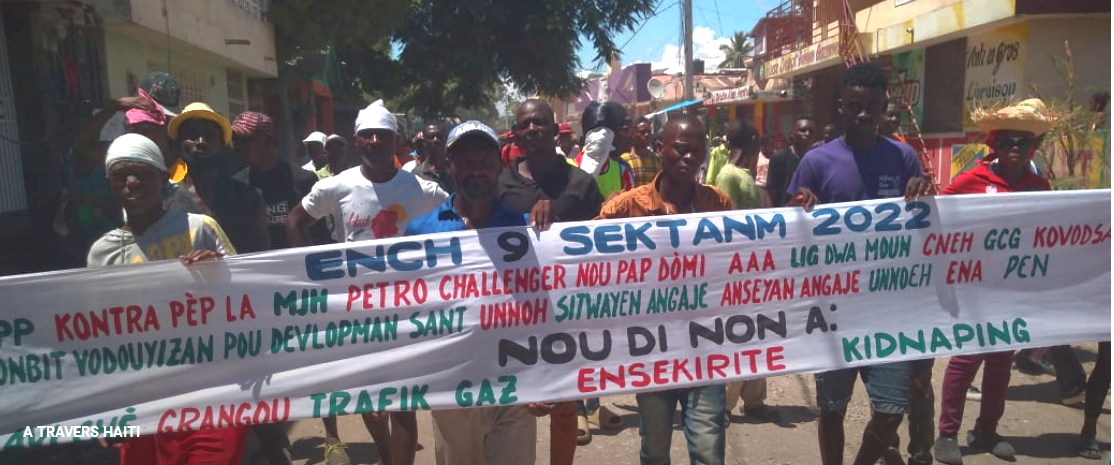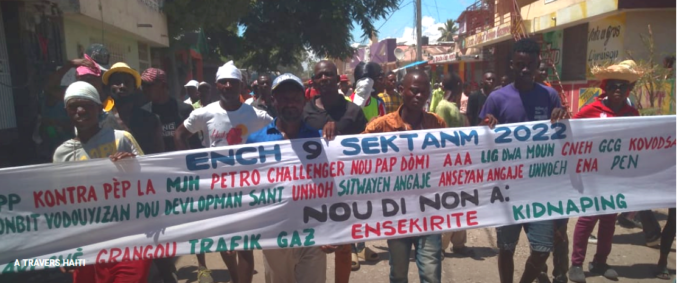

Marche in Hinche (Ench in Creyol), Haiti. Banner in Creyol gives the date and place of the march, organizations involved, and says, roughly, “We say no to: hunger, speculation in gas, lawlessness, kidnapping.”
Since August 22, the date when the Haitian Revolution began in 1791, hundreds of thousands of Haitians have taken to the streets in every city and many towns to repeatedly say “down with misery.”


Marche in Hinche (Ench in Creyol), Haiti. Banner in Creyol gives the date and place of the march, organizations involved, and says, roughly, “We say no to: hunger, speculation in gas, lawlessness, kidnapping.”
They are staying in the streets even in the face of warnings about inundations from Hurricane Fiona, which is currently devastating Puerto Rico. The mass anger has been reflected in the streets of Port-au-Prince and other cities filled with burning barricades and closed stores. Many embassies and consulates have closed to avoid confrontations that could turn deadly.
Haitians demand that Acting Prime Minister Ariel Henry pull up his stakes and leave, an end to high prices — lavichè, an end to the climate of fear and instability, an end to a state that doesn’t even provide drinkable water, much less public health and education. Many poor and working-class neighborhoods in Port-au-Prince are running short on water, since their usual water truck deliveries have been disrupted by the protests.
As the demonstrations have grown more militant, the cops have grown more aggressive, as the killing of two journalists recorded on video indicated.
Protests in Gonaïves and Hinche
Gonaïves is a seacoast city with a population of 300,000, north of Port-au-Prince, where Jean-Jacques Dessalines proclaimed Haiti’s independence in 1804. Protesters in Gonaïves attacked six institutions: the U.N.’s World Food Program, the Holy Family Church, the United Nations Office for Project Services, the offices of the clergy, the La Couronne brewery and the headquarters of the former departmental director of Public Works. (tinyurl.com/2p8j2ups)
Video of the Gonaïves protests show people, mainly women, carrying off big sacks of grain or flour. The WFP claimed that it lost 1,400 metric tons of food that it was planning on giving as 600,000 meals to children over the rest of the year. But people are hungry NOW!
Hinche is one of the oldest towns on the island of Hispaniola, on the Central Plateau, about equidistant from Cap-Haïtien and Port-au-Prince, close to the Dominican border. It has about 25,000 people. Hinche was the site of a historic rally in 1990, when Jean-Bertrand Aristide’s campaign drew 30,000 people out to support him.
The Sept. 6 protest was organized by a coalition called the Table of Opposition, which held three simultaneous demonstrations. Each demonstration denounced lawlessness, kidnappings, living expenses going through the roof and the current government’s incapacity to resolve this crisis.
The demonstrations eventually merged and marched together through Hinche, setting up burning barricades. Banks, public transport and the Hinche market were closed. The cops used tear gas to disperse the crowd. There were injuries but no deaths. The Table of Opposition included civic and community organizations, some small political parties, human rights organizations and the teachers union. (tinyurl.com/5n6m78pu)
U.S. response
Haitians are generally fed up with both the U.N., which has refused to take responsibility for the cholera it introduced into Haiti — twice — and the United States which has deported over 20,000 Haitians in 2022 under atrocious conditions.
The satrap they picked, Ariel Henry, raised fuel prices by 100% in the midst of national protests over high fuel prices. He had the gall to claim “The State needs 3 billion gourds [Haiti’s national currency] to launch some social program.” Fanning the flames, albeit with the blessings of the IMF.
But could the U.S. find a better tool for keeping Haiti in line is a question they haven’t yet answered.
The Miami Herald ran a Sept. 16 story that the U.S. has a program to equip and train more SWAT teams for the Haitian police without paying their salaries.
Dominican Republic President Luis Abinader came a week before the U.N.’s annual week of General Assembly activities in New York City to push for military intervention in Haiti, with speeches before U.S. as well as Dominican audiences. He claims that there is a low-level, incipient civil war going on in Haiti.
Whatever U.S. imperialism decides to do in Haiti, progressives in the U.S. should oppose any interference in Haiti’s internal affairs and support reparations for all the past and present racist atrocities the U.S. has inflicted.
In the 1950s, when Japan and much of Europe was in ruins, the U.S. accounted…
This “Call from the General Federation of Trade Unions in Gaza to Labor Unions in…
Desde que la administración de Donald Trump/Elon Musk tomó las riendas del poder a finales…
Philadelphia Palestine activists marched from Philadelphia City Hall to Day & Zimmermann on April 18…
Marching up Blue Hill Avenue through the Black and immigrant Dorchester neighborhood, Trans Day of…
This statement was recently issued by over 30 groups. On Friday, March 28, Dr. Helyeh…